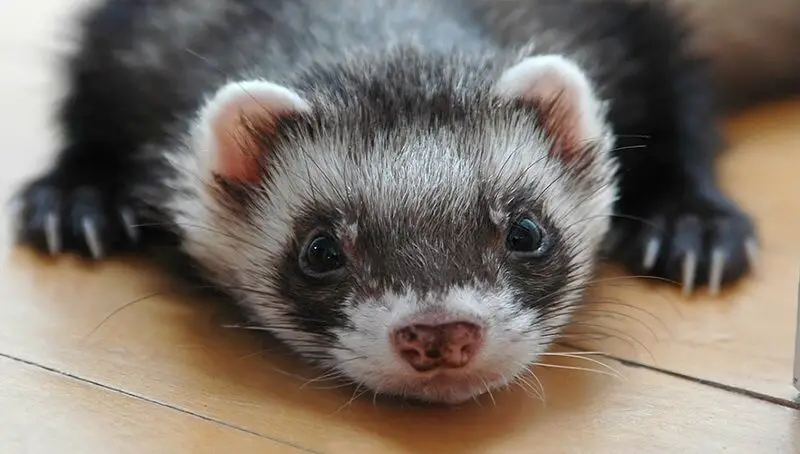Through their cute looks and hectic nature, ferrets have won the hearts of many animal lovers around the world and are among the ten most popular pets. Those who are thinking of buying this wonderful animal are naturally interested in how to feed the ferret at home.
Can ferrets eat fruits?
Yes, ferrets can eat fruits, but you should avoid adding them to their diets. Indeed, fresh fruits and vegetables will have the effect of promoting digestive issues to your ferret like diarrhea, constipation, and stomach pain. Above all, too much sweet will increase the pet’s weight at best and lead to severe pancreatic disease at worst. However, grapes, cooked beans, cucumbers, and fruit juice can be given very rarely and in very small quantities.
You might also like my articles on whether ferrets are good with children and whether ferrets can eat bacon.
What can a ferret eat?
When drawing up a meal plan for a pet ferret, it is worth considering that this animal is, by nature, a predator, and therefore a significant proportion of its diet is based on meat. Under natural conditions, ferrets feed on various small animals, mainly mice and rabbits. They don’t say no to birds, frogs, worms, or insects. Eggs, poultry, and fish are also included in their diet. Practically, wild ferrets do not eat plant foods, berries, and fruits, because they are poorly processed by their stomach. However, such a diet seems unbalanced only at first glance. Protein from alive food contributes the most to the complete development of these animals.
Ideally, the diet of a ferret at home should be as close as possible to its natural diet. However, many owners refuse this way of feeding animals for obvious reasons. Not everyone can calmly watch how their pet crushes cockroaches with pleasure or devours a mouse. In addition, the daily supply of these fresh feeds is problematic and is not cheap. Fortunately, there are alternative feeding methods available to keep your ferret healthy and happy.
The fact is that although ferrets in the wild ignore plant foods, they get them in their diets by eating small animals. Along with the meat, the undigested food of its victims reaches the stomach of the ferret, which the body breaks down into carbohydrates, vitamins, and minerals.
What fruits can a ferret eat?
As mentioned earlier, the diet of a ferret should not consist only of meat, as it does not cover the animal’s need for minerals and carbohydrates. To achieve a balance in the diet of the animal, it is worth diversifying the feeding with other products, but this must be done responsibly.
The fruit should be cut into small pieces or pureed. The share of fruits should not exceed 10% of the total amount of food.
Ferrets like to enjoy sweet berries and fruits, such as:
- raspberries;
- banana;
- mangoes;
- Japanese date palm,
- apple;
- pear;
- watermelon;
- wild strawberries;
- currant;
- cherry, sweet cherry;
- gooseberry.
It is preferable to feed the ferrets with raw fruits that are cut into small pieces after you have previously peeled them so that the animals won’t get constipation. Dried, candied, and preserved fruit, citrus fruit, grapes and raisins, avocados, pineapple, and melon are not recommended due to the fact that they are toxic to the animal’s body.
Prohibited foods
Some foods are strictly forbidden to ferrets: cooked products or cheap low-quality foods contribute to the appearance of a disorder of the digestive system and sometimes cause serious diseases. Human food is not always suitable for animals, so it is not desirable to give them food from a basic meal.
Citrus fruits increase the acidity of their stomach; milk contains lactose, a substance that is not absorbed by the body of the pet and can cause diarrhea.
Prohibited products:
- nuts, onions, garlic;
- citrus fruits;
- ice cream;
- chocolate, sweets, cakes;
- soups;
- pork, smoked;
- soya products;
- grilled meat;
- pickles;
- sparkling water;
- salt,
- preserved fruit,
- citrus fruit,
- grapes and raisins,
- avocados,
- pineapple,
- melon.
Final words
After you have decided to feed your ferret with natural food, you should be very careful about what food can be given to the animal, because an incorrectly selected diet can seriously harm the animal. Moreover, it is important to remember that some products from the daily diet are necessary, and others should be administered as occasional snacks and in a strictly allocated amount.
Exclusively carnivorous, ferrets must ingest meat, a source of animal protein, and specially designed croquettes. Fruits and vegetables are not recommended or will have to be given in very small amounts, and occasionally.




